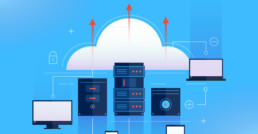Understanding The Role of VPNs in Enhancing Security
The need for robust security measures to protect sensitive information has become more crucial. Virtual Private Networks (VPNs) have emerged as an indispensable tool for ensuring data privacy, confidentiality, and online security. Understanding the role of VPNs in enhancing security is critical in keeping you and your business safe from cyber threats. Let's discuss what a VPN is and how it can shield companies from potential threats.
A Virtual Private Network (VPN) is a secure connection that allows users to access the internet privately and securely by creating a private network from a public internet connection. It establishes an encrypted tunnel between the user's device and the destination website or online service, shielding their online activities from prying eyes.
When users connect to a VPN, their device establishes a secure connection with a VPN server. This server is an intermediary between the user's device and the internet. All internet traffic between the user and the VPN server is encrypted, preventing unauthorized parties from intercepting and accessing the data.
Data Encryption:
VPNs employ robust encryption protocols to protect sensitive data transmitted over public networks. This encryption ensures that the information remains unreadable to malicious actors even if intercepted, maintaining the confidentiality of business communications and proprietary information.
Remote Work Security:
With the rise of remote work, VPNs have become invaluable for ensuring secure connections between employees and company networks. VPNs enable remote workers to access internal resources and systems securely, mitigating the risks of accessing sensitive company data from unsecured networks.
Protection against Cyber Threats:
VPNs serve as a first line of defense against cyber threats, including hackers, identity theft, and malicious software. By encrypting internet traffic and masking IP addresses, VPNs make it challenging for cybercriminals to infiltrate business networks and compromise valuable information.
Geo-Restriction Bypassing:
Many businesses operate globally and may encounter restrictions on accessing certain online services or content based on geographical location. VPNs allow enterprises to bypass these limitations by routing their traffic through servers in different areas, enabling unrestricted access to information and resources.
Secure Collaboration:
Businesses often rely on collaboration tools and cloud-based platforms to share and store sensitive data. By using a VPN, companies can ensure secure communication and file sharing among team members, protecting valuable intellectual property and maintaining client confidentiality.
Mitigating Insider Threats:
VPNs assist in mitigating the risks associated with insider threats by monitoring and logging users' activities. This aids in identifying any unusual or unauthorized behavior, allowing businesses to take appropriate action before any harm occurs.
In the digital landscape, where cyber threats continue to evolve, businesses must prioritize security measures to safeguard their valuable assets. Virtual Private Networks (VPNs) provide a crucial layer of protection by encrypting data, maintaining privacy, and allowing secure access to business resources. From protecting against cyber threats to enabling safe remote work, VPNs have proven essential for businesses seeking to maintain online security in an increasingly interconnected world. By embracing VPN technology, companies can fortify their defenses, ensuring the safe and secure operation of their critical systems and data.
Poison Attacks 101
Smart technology is everywhere. Not just in our offices, but even in our day-to-day lives with tools like Google Home and Alexa becoming a commonplace. With technology becoming smarter every minute, the risks are increasing by the minute as well. Cyber-criminals are finding new ways to corrupt our IT networks to disrupt our businesses, hold our data hostage and even clear out personal bank accounts. Some of the more overt, commonly known acts of cyber-crime include hacking, phishing, and ransomware attacks. This article discusses a lesser-known cyber-crime. Let's take a look at Poison Attacks 101.
What Are Poison Attacks
Poison attacks are attacks on the ability of a system to make smart decisions. Think about this for a second. How do systems make intelligent decisions? Based on the training or data they receive. This data is used to hone the artificial intelligence of the system to help make smart decisions. Poison attacks mess with the very base layer – the training data set - by skewing the system’s data model in such a way that the output is no longer as intended. They create a new normal for everything and are primarily used as a backdoor attack method. In a backdoor poison attack, the attacker creates a loophole in the core data rule and trains the system to adhere to that rule so it can be exploited at a later time.
For example, let’s say the access control for a particular file is set such that it will allow only those beyond the VP level to view the data. If someone changes the main parameter to include manager level access, the core data set is violated and the system will not detect an intrusion by someone at the manager level, even if they log in with their credentials.
Poison Attack Methodologies
Poison attack methodologies typically fall into one of the following 4 categories:
-
- Logic Corruption
- Data Manipulation
- Data Injection
- DNS Cache Poisoning
Logic Corruption
In Logic Corruption, the attacker changes the basic logic used to make the system arrive at an output. It essentially changes the way the system learns, applies new rules and corrupts the system to do whatever the attacker wants.
Data Manipulation
In Data Manipulation, as the name suggests, the attacker manipulates the data to extend data boundaries that result in backdoor entries that can be exploited later. Unlike Logic Corruption, the attacker doesn’t have access to the logic, so they work with the existing rule and push data boundaries further with a view to accommodate them later.
Data Injection
In Data Injection, the attacker inserts fake data into the actual data set to skew the data model and ultimately weaken the outcome. The weakened outcome then serves as an easy entryway for the attacker into the victim’s system.
Protecting Yourself Against Poison Attacks
Data poisoning by way of logic corruption, data manipulation and data injection happens when the attacker finds a way to access your data set. The kind of poison attack varies depending on the level of access the attacker is able to achieve. Here’s what you can do to ensure such access is prevented:
- The data poisoning attacks discussed above adversely affect your IT system’s machine learning capabilities. So, the first logical step would be to invest in a good machine learning malware detection tool. These tools are different from the typical anti-malware tools you get in the market and are specifically designed to prevent machine learning capability poisoning.
- Always follow general IT security best practices such as:
- Training your employees to identify spam, phishing attempts, and possible malware attacks.
- Following good password hygiene, which means never sharing passwords and only using passwords that meet the required security standards.
- Having a powerful IT audit process, tracking and version control tools, so as to thwart any possible insider attack.
- Ensuring the physical security of your IT systems by way of bio-metric access, CCTV systems, etc.
DNS Cache Poisoning
In one of the most common poisoning attacks, the attacker poisons the DNS Cache with the aim of leading visitors to a fake website. In a DNS cache poisoning case, the attacker gains control of the DNS server and then manipulates cache data such that anyone typing the URL of the actual website is redirected to the fake one. This could be a phishing site where the attacker would have carefully laid out a trap to capture the unsuspecting victim’s personal data or secure information. For example, the visitor thinks they are logging into their bank’s website online, but are actually on the attacker’s phishing site, where they enter the login credentials.
Protecting Yourself Against DNS Cache Poisoning Attacks
As discussed before, one of the most common poisoning attacks are DNS attacks. You can prevent this by bringing a trained professional onboard for your DNS server set-up. An expert will know to set up your DNS server such that it has a minimum relationship with other, external DNS servers, thus limiting your attacker’s ability to corrupt your DNS server using theirs.
As a best practice, ensure that your DNS servers only store data related to your domain and not any other information. It is harder to corrupt the system when it focuses on a single element.
Another best practice is to ensure that you are up-to-date on all DNS security mechanisms and are using the most recent version of the DNS.
Ensure your site has an SSL certificate and is using HTTPS protocol. Using encryption, a site with HTTPS protocol allows for a more secure connection between its server and the internet and is better at keeping cyber-criminals out. Have an SSL certificate also ensures your site’s name shows up alongside the URL in the address bar. This is an easy way for visitors to identify if they are on a genuine site or not, thus helping them steer clear of phishing attacks and clone sites.
Data poisoning is one of the lesser-known and hence less talked about forms of cyber-crime. But, it can inflict great damage – perhaps even more damage than the other obvious threats such as viruses and ransomware, because, unlike a Denial of Service (DDoS) attack or a Ransomware attack where you know the moment the malware has hit your system, in a data poisoning attack, the malware is incorrect data that slithers into your system quietly and changes its overall functioning before delivering the big blow.
Preventing attacks on your data and infrastructure is where Unique Computing Solutions specializes with comprehensive Managed Security Service packages an a complete team of professionally educated technicians to back it all up. Give us a call today to see how we can help improve your security from day one: 708-922-9444
Cloud Security Essentials
More and more businesses are switching to the Cloud to store their data and rightly so. The Cloud offers numerous benefits over the traditional, physical on-site server, however it also comes with it's own potential issues. Follow along as we explore Cloud Security Essentials in the article below.
Network Attached Storage - What Does It Mean For You?
Having a storage device for all your important files and folders is a necessity in today's business environment. Whether you're a small business or an enterprise, a network attached storage, or NAS, device can enable you to easily share files and folders with others on your local network.
5 Technologies You Need to Power Your Remote Workforce
In a tech-driven world where digital is king and consumers are demanding transparency and reliability, working from anywhere becomes crucial to the success of your business. But the IT challenges that come with working remotely are intimidating, and you’re not always sure how to get started. Managed services is your answer, and here are five ways managed services can help get you started:
Why Should You Consider IoT? The Good, the Bad and the Intergration
As technology progresses, we’re finding new ways to keep all of our devices connected for a seamless user experience. This idea is called the Internet of Things (IoT), and it works for more than just computing devices – it also includes mechanical and digital objects.
From microwaves, washing machines and lamps to televisions, projectors and security systems, connecting your technologies is a powerful concept. Gartner predicts that IoT will be a $1.9 trillion industry by 2020. So, what do you need to know to take advantage of this trend to grow your business?







